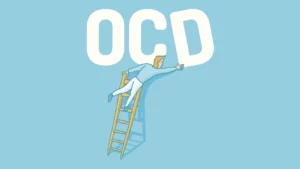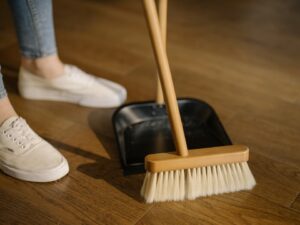Obsessive Compulsive Disorder is an anxiety disorder that is characterized by intrusive thoughts and repetitive behaviors. One of the most common symptoms of OCD is an obsession with cleaning. This can be very frustrating and overwhelming for the individual and their loved ones. Clean OCD results in an excessive obsession with neatness and Cleanliness. There are many treatments available for OCD, but it is important to seek professional help to get the best results. In this blog post, we will discuss the symptoms, treatments, and general tips for dealing with OCD. We hope that this information will be helpful for those who are struggling with this disorder.
Contents
Defining OCD

OCD is a mental disorder that is characterized by obsessions and compulsions. The obsession part of OCD can manifest itself in many different ways, but the most common form is an obsession with cleanliness and order. This can manifest itself in the form of compulsive hand-washing, cleaning, or organizing. People with OCD often feel like they have to perform these behaviors to prevent something bad from happening. The compulsions are often time-consuming and interfere with daily life.
A common type of OCD is clean OCD, where the individual engages in rituals such as cleaning or washing that interfere with their everyday lives. An obsession is an unwanted and bothersome thought or feeling. By constantly reminding the OCD patient that a certain surface or object is flawed or polluted, it causes cleaning activity. The persistent thinking causes severe anxiety to increase.
The Obsession with Cleaning

One of the most common symptoms of OCD is an obsession with cleaning. This can be very frustrating and overwhelming for the individual and their loved ones. The individual may feel like they need to clean all the time to avoid contamination. Cleaning or washing OCD results in the obstruction of a person’s daily activities due to Cleaning or washing compulsions. It can be directed towards the self e.g. excessive hand washing, or cleaning of the house.
The obsession part of OCD can manifest itself in many different ways, but the most common form is an obsession with cleanliness and order. This can manifest itself in the form of compulsive hand-washing, cleaning, or organizing. People with OCD often feel like they have to perform these behaviors to prevent something bad from happening. The compulsions are often time-consuming and interfere with daily life.
People with this symptom often feel like they can never get rid of the dirt and germs. They may also have specific rituals that they must follow to feel “safe” from harm. These rituals can take up a lot of time and energy and can be very disruptive to everyday life.
Compulsive cleaning and arranging are frequently linked to concerns about contamination. A requirement for symmetry and balance can cause compulsive organizing Therapies, medicines, and procedures that stimulate sections of your brain thought to be involved in the condition can all help with this issue.
Other Symptoms Of Clean OCD
The most common symptom of OCD is an obsession with cleaning. This can be very frustrating and overwhelming for the individual and their loved ones. Other symptoms of OCD include:
- Unwanted doubts
- Impulsive actions
- Trying to achieve perfection
- Fear of contamination
- Excessive washing
- Avoiding people
- Excessive Checking
- Intrusive thoughts
- Irrational Compulsions
- Frequent Anxiety
- Depression and Stress
- Anger Issues
- Recurring Frustration
There are many treatments available for OCD, but it is important to seek professional help to get the best results.
Is OCD Present in All Neat-Lovers?

OCD can entail an unexpectedly wide range of difficulties, therefore not all OCD sufferers are especially obsessed with cleanliness. Some may have issues with compulsive skin picking, while others can’t stop themselves from ordering and reordering their bookshelves according to color. The one unifying factor is that all OCD behaviors serve the same purpose: providing temporary relief from anxiety.
It is a prevalent misperception that people with OCD are “neat freaks” or “clean freaks,” possibly because cleanliness and orderliness are common OCD. However, there is a distinction between being a “clean freak” or “neat freak” and having an OCD diagnosis. A disorder is a matter of degree, like many other things in the realm of mental health. The fact that the obsessions and compulsions are excessive, irrational, and interfere with daily functioning is a component of OCD.
What Does Research Say?
Recent research on Obsessive Compulsive Disorder shows that this is a real mental health problem.. The study done by the Anxiety and Depression Association of America (ADAA) shows that this is a problem that many people suffer from and it can be very debilitating. The study showed that specific areas of the brain are responsible for these obsessive thoughts. The research showed that medication and therapy can treat the imbalance of serotonin in people with OCD.
Treatments for Obsessive Cleaning
There are many treatments available for OCD, but it is essential to seek professional help to get the best results.
Cognitive-Behavioral Therapy (CBT)
It is one of the most effective treatments for OCD. This type of therapy helps the individual to identify and challenge their negative thoughts and beliefs. The goal of cognitive behavioral therapy is to alter the automatic negative ideas that cause and exacerbate emotional problems, sadness, and anxiety. These uncontrollable unpleasant thoughts can control the mood of a person.
Exposure and Response Prevention (ERP)
It is another effective treatment that involves gradually exposing the individual to their fears and triggers while teaching them how to control their urge to engage in compulsive behaviors. The patient is also taught how to suppress the temptation to engage in obsessive activities while being gradually exposed to their anxieties and triggers.
Medications
There are several types of medications that can be used to treat OCD, including antidepressants, anti-anxiety medications, and antipsychotic medications. These help in OCD by reducing anxiety and OCD symptoms. Medications are used in combination with therapy.
Self-Care Tips To Check OCD

There are a few things that you can do to help manage your OCD.
Identify your triggers: You should try to identify what triggers your OCD. Knowing your triggers will help your obsessive thoughts by preparing your mind for the compulsion that you are going to experience due to that trigger.
Challenge your thoughts: If you are having negative thoughts, try to challenge them. Are they true? What evidence do you have to support them?
Avoid avoidance: It can be tempting to avoid situations that trigger your OCD, but this will only make the problem worse in the long run.
Talk to someone who understands: It can be helpful to talk to someone who understands what you’re going through. They can offer support and advice.
Conclusion
Cleaning Obsessive-Compulsive Disorder (COCD) is a genuine mental health condition and overlooking it can cause further problems. Cleaning is one of the most frequent OCD symptoms. It might be extremely aggravating and disorienting for both the person and their loved ones. The individual may think they need to clean all the time to
If you think you may have OCD, get professional assistance right away. There are a plethora of successful therapies available, so there’s no need to live with this problem any longer. You can live a happy and healthy life if you receive the correct treatment. We provide the finest healthcare services tailored to your specific needs. You can book an online therapy or download our free OCD treatment app on Android or iOS.


